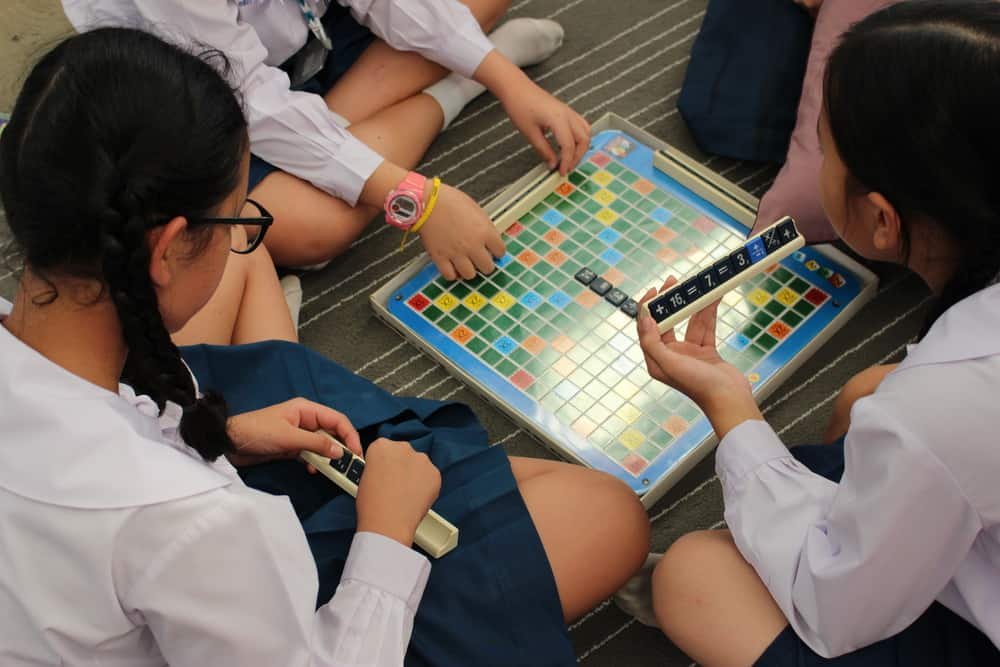Last Updated on January 7, 2024 by Gamesver Team and JC Franco

Nowadays, there is a plethora of board games for your children to choose from, but how do you determine which game is best? There is a long list of both fun and educational games, but the endless options don’t make the choice any easier. In fact, most games have some sort of educational element, making it harder to decide which one is best to expose your kids to.
When I was growing up, Scrabble was a firm favorite in my family home, and I strongly believe that all kids should be exposed to it – actually grow up with it – just like I did. If I look back to my youth and what Scrabble taught me, I am thankful for the many years that I was exposed to it. My spelling is undeniably great, my vocabulary is extensive, and I find myself thoroughly enjoying anything to do with the written word – whether it is reading or writing. I also find that I am able to communicate more easily than others who were not exposed to word games of a similar nature growing up.
At this point, if I was you, I would be rushing out to buy a Scrabble game. You might need a bit more convincing, though, which is absolutely fine. Below you will find about the 18 benefits of playing Scrabble for children.
18 ways playing Scrabble can benefit your kids. Playing Scrabble:
1. Assists with memory training.
Scrabble can be a great game for your memory function. Part of playing Scrabble is learning new words and trying to remember them so that you can use them in the future. This type of word learning directly impacts on the performance of the brain and, in turn, boosts cognitive function.

2. Promotes cognitive skills development.
Cognitive function is something that all children need to develop early on in life. A person’s cognitive functionality or capacity refers to their ability to remember things, solve problems, make decisions, learn new things, think creatively, and reason. Scrabble helps to develop the brain in each of these areas.
3. Enhances quick-thinking skills.
To play Scrabble and be good at it, children need to be thinking ahead and constantly on the lookout for new word-forming possibilities. This type of thought process practiced on a frequent basis goes a long way towards training the brain to think quickly and act just as quickly. This is a skill that will prove valuable in all areas of life.
4. Provides an opportunity to bond as a family.
Not many children’s games encourage family bonding these days. Kids spend far more time playing computer games, texting on their mobile phones, or watching TV than they do talking to family members and actually sharing how their day was. Unfortunately, none of these pastimes is conducive to bonding with family. Scrabble provides the perfect change of focus for the whole family. And anyone can get involved – young and old.
5. Is an educational way for kids to have fun.

The main objective of most parents is to ensure that their kids are involved in playtime that educates and motivates them. If you do not want your child playing games that just pass the time, look out for something educational. Scrabble is a good option because it is fun and teaches kids new words, while helping them build a bigger vocab.
6. Improves spelling skills.
Does your child need a bit of a boost when it comes to spelling? Don’t worry! Scrabble can help! Children undoubtedly learn new words every time they play a round of scrabble. With every new word comes the opportunity to learn to spell better. Children that play Scrabble early on in life go on to be great spellers and good readers too.
7. Enhances decision-making skills.
Is your child good at making decisions? Is he/she able to weigh up the situation and make an informed and confident decision? Forming new words can be difficult, but there is a time limit on each player’s moves. Therefore, children learn to become certain of their play or word quickly and definitively.
8. Builds a bigger vocabulary.
If you want your child to have an extensive vocab, he/she needs to start learning new words early on in life. With every game of Scrabble comes the opportunity for a child to add a new word or two to his/her vocabulary. And learn the meaning of the world and how to use it too.
9. Enhances communication skills.

In order for children to present their new word and possibly explain it if required, there needs to be a level of clear, concise, and respectful communication between players. Scrabble teaches children to communicate appropriately from an early age.
10. Improves mathematical ability (adding and subtracting).
To tally up points, children need to have decent addition skills. This helps to develop sound adding mathematical skills.
11. Develops the skill of anagramming.
Anagramming is a great way of getting the brain to “think on its feet”. Anagramming is the process of forming new words by moving the letters of an existing word around.
12. Promotes and develops strategic thinking skills.
Strategy is important in a game of Scrabble. The word that a player forms (and where they place it), could help another player to earn more points, or deter them from the same. In order to get ahead, a player has to be strategic about how he/she plays.
13. Teaches organizational skills.
Children will need to organize their letter tiles accurately and ensure that everything is always in order if they want to play correctly without missing on opportunities. Learning this type of organizational planning will stand a child in good stead all throughout his/her life.
14. Fosters healthy relationships with friends.
Children that learn to play educational games together learn to help each other learn, teach each other new things, and learn to communicate and share ideas in a mature and mutually respectful manner. This does wonders for building long-term, meaningful friendships. The next time your kids have friends over to play, haul out the Scrabble instead of turning on the television.
15. Boosts language and speech skills.
When children are exposed to new words, they learn to use advanced language and speech skills. As they grow older, the way they communicate will be advanced or seen as “mature” when compared to their peers.
Part of the learning process, when a child learns/hears a new word while playing scrabble, is to say it, check how it is spelled, look up its meaning and use it in a sentence. All of this goes towards boosting a child’s speech and language skills. Having advanced language and speech skills will be extremely helpful to your child later on in life.

16. Builds confidence and self-esteem.
All eyes are on each player when they take their turn. This can be nerve-racking in the beginning, but as children become more comfortable with the idea, they become more confident. Getting words right and earning points is also a great boost for a child’s self-esteem.
17. Develops healthy competitiveness.
Of course, the point of playing Scrabble is to win. Children want to prove that they know more words than other players and revel in the idea of winning. Scrabble is, however, a game that promotes healthy communication and helps children to be competitive in a healthy way.
18. Distracts kids from screen time.
If your children find themselves stuck in front of screens all day long, you might want to drag them away with a little healthy distraction. Board games with a fun and educational element are ideal for deterring excessive screen time and encouraging children to have fun by actually interacting with one another.
Last Word
When it comes to finding classic board games that will do your children good, you quite simply cannot go wrong with Scrabble. I played it as a kid, my parents did too, and I can quite honestly see the next few generations carrying on the family Scrabble-playing tradition.

